Marchés
Lors de la conception d’une intervention humanitaire et de la prise de décisions quant à l’utilisation des transferts monétaires, l’analyse générale des options de réponse doit inclure une analyse de marché. Il est prouvé qu’offrir un soutien ciblant le fonctionnement des marchés accélère la reprise et accroît la résilience dans les zones affectées par une catastrophe.
De nombreuses organisations ont investi dans la mise au point d’outils visant à faciliter l’analyse de marché et réfléchissent à la mise en place de programmes basés sur les marchés plus holistiques. Elles envisagent des interventions tirant profit du marché (basées notamment sur des transferts monétaires aux populations affectées), ainsi que des interventions soutenant directement les marchés (comme l’octroi de subventions conditionnelles aux vendeurs/euses pour la remise en condition du marché).
Initiatives associées
Contenu associé

1.2 Introduction à l’analyse de marché
Cours
Ce cours de 30 minutes offre une introduction à l’analyse de marché pour les contextes d’urgence. Il contient des contributions d'experts dans ce domaine. Ce cours a été développé en collaboration avec l'International Rescue Committee et le CALP Network et grâce au financement d’USAID/OFDA et de l’Agence Suisse pour le Développement et la Coopération. Il est destiné aux...

2.4 Un guide pratique pour l’analyse de marché
Cours
Ce cours en ligne de 3.5 heures vise à fournir aux équipes qui conduiront des analyses de marchés en contextes humanitaires une compréhension approfondie de la théorie et des étapes à suivre afin de leur permettre de comprendre le pourquoi et le comment du processus à suivre. Les participants seront guides à travers un scenario d'analyse de marchés d'urgence. Ce cours s'appuie sur...
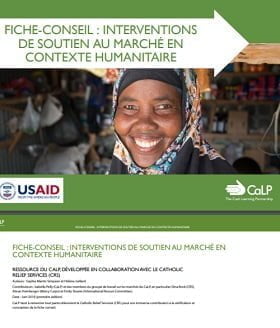
Fiche-Conseil : Interventions de soutien au marché en contexte humanitaire
Guides et outils
La fiche conseil définit le programme de soutien au marché en contexte humanitaire et le décrit dans la pratique. Elle permet aux praticiens humanitaires d’envisager systématiquement des interventions de soutien au marché, parallèlement à d’autres activités du programme. Le champ d’application comprend des interventions de soutien au marché axées sur l’offre/la disponibilité...
Thematic lead
Latest
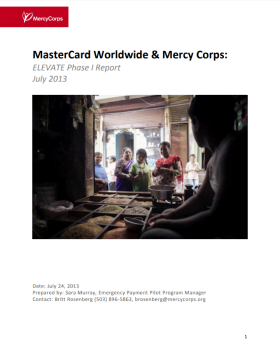
MasterCard Worldwide and Mercy Corps: ELEVATE phase I report
Report
The Nepal pilot focused on testing several key stages in the deployment of mobile vouchers, including the following: Identify a technology partner, Customize a mobile voucher platform, and Use the platform to distribute goods to people in need. Two different types of mobile vouchers (SMS and smartphone...
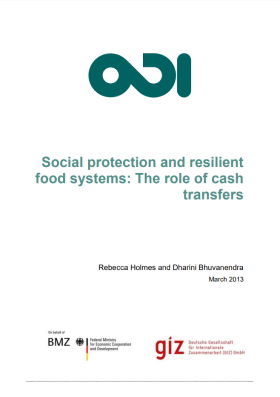
Social Protection and Resilient Food Systems: The role of cash transfers
Policy paper
Cash transfers – a form of social protection – have been increasingly used as a tool for reducing poverty and vulnerability in middle and low-income countries over the past decade. More recently, cash transfers have also been used as an alternative to food aid in humanitarian contexts. The objective...

Rôle des mobilités saisonnières dans l’économie des ménages pauvres – République Islamique de Mauritanie
Rapport
L’étude sur le rôle des mobilités saisonnières dans l’économie des ménages pauvres a été réalisée dans le cadre du projet de Transferts Economiques et Sociaux (TES) mis en oeuvre par la Croix Rouge française (CRF) et le Croissant Rouge mauritanien dans la commune de Tikwobra, Moughataa de...

Logistics and Administration Guideline for Cash Based Interventions – Annexes
Guidelines and Tools
These annexes are designed to be used alongside the Logistics and Administration Guideline for Cash Based Interventions, which aims to support logisticians and administrators to successfully support cash based interventions (CBIs) and to help technical departments too. The annexes include: a the CALP...
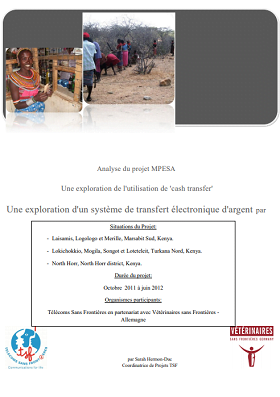
Analyse du projet MPESA, Une exploration de l’utilisation de ‘cash transfer’
Rapport
Safaricom Limited, opérateur de services mobiles au Kenya, a lancé en 2007 un système de transfert d’argent par mobile: M-PESA. Ce système permet aux utilisateurs d’envoyer ou de recevoir de l’argent sur leur carte SIM Safaricom. Télécoms sans Frontières et Vétérinaires sans Frontières –...
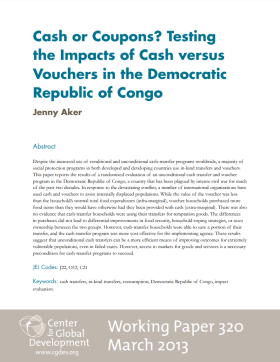
Cash or Coupons? Testing the impacts of cash transfers versus vouchers in the Democratic Republic of Congo
Report
Despite the increased use of conditional and unconditional cash-transfer programs worldwide, a majority of social protection programs in both developed and developing countries use in-kind transfers and vouchers. This paper reports the results of a randomized evaluation of an unconditional cash transfer...
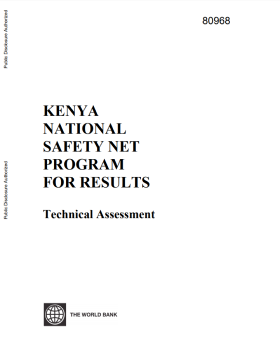
Technical Assessment of the Kenya National Safety Net Program for Results
Report
One of the priorities outlined in the National Social Protection Policy (NSPP) in Kenya, is the government’s ambition to enhance social assistance by developing the necessary institutions and strengthening operational systems while expanding the coverage of such programmes. To help realise this policy...
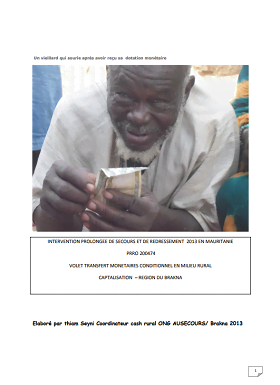
Intervention prolongee de secours et de redressement 2013 en Mauritanie – volet transfert monetaires conditionnel en milieu rural captalisation (region du Brakna)
Rapport
L’ONG AU SECOURS (Association Humanitaire pour l’environnement) a été retenue comme partenaire de mise en œuvre du volet «Transferts monétaires conditionnel en milieu rural» dans le cadre du projet financé par PAM/ en partenariat avec la Grande Bretagne, la Suède et le Danemark, d’appui aux...

Comparative Review of Market Assessments Methods, Tools, Approaches and Findings
Guidelines and Tools
Against a backdrop of climate change, global economic crises and commodity market volatility, food security experts are increasingly interested in deepening their understanding of how markets work. In 2011, the the CALP Network commissioned this study, which aimed to assess how we are currently analysing...

Buttressing Supply Chains Against Floods in Asia for Humanitarian Relief and Economic Recovery
Report
Floods are the most frequent category of disasters worldwide. Among all geographical regions, Asia has suffered the most. While there are several ongoing humanitarian efforts and initiatives, we believe there is a new opportunity to coordinate “last mile” humanitarian efforts in the event of a...
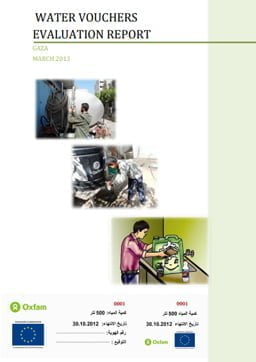
Water Vouchers Evaluation Report, Gaza 2013
Report
A participatory assessment on disaster risk reduction (DRR) was undertaken in GAZA governorate in 2011, OXFAM being the lead agency within the WASH cluster emergency response and preparedness in this area. Three vulnerable neighbourhoods (AL MALALHA, AL MOGRAGHA and AL ZARGA), were identified and an...

Building Women’s Economic and Social Empowerment Through Enterprise: An experimental assessment of the Women’s Income Generating Support (WINGS) program in Uganda
Report
Investing in women is said to be a key to development. Educate her, buy her a cow or goat, or help her start a business and great things will follow: sustained increases in income, greater empowerment and social inclusion, health and education for the children, and (especially in war-affected regions)...

Evaluation de Différentes Stratégies de Distributions Préventives de la Malnutrition au Niger: Rapport Final
Rapport
Parmi les enfants de 6 à 59 mois traditionnellement pris en charge dans les programmes nutritionnels au Niger, la tranche d’âge la plus à risque de malnutrition aiguë est celle des enfants de 6 à 23 mois. Plusieurs types de produits sont disponibles actuellement pour prévenir la malnutrition : les...

Livelihood Coping and Recovery from Disaster: The case of coastal Bangladesh
Report
Bangladesh has a long history of coping with and recovery from disasters. Although climate extremes are increasingly taking huge tolls especially in the southwestern part of the country, households are resisting the negative outcomes of these events eventually. This research explores the livelihood...
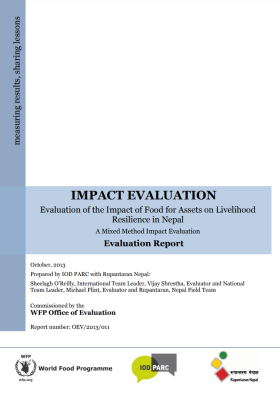
Impact Evaluation: Evaluation of the impact of food for assets on livelihood resilience in Nepal
Report
This evaluation, conducted by an independent team between January and July 2013, assessed the outcomes and impacts of the food-for-assets (FFA) components of two WFP programmes in Nepal: country programme (CP) 100930 (2002–2007) and protracted relief and recovery operation (PRRO) 106760 (2007–2010)....
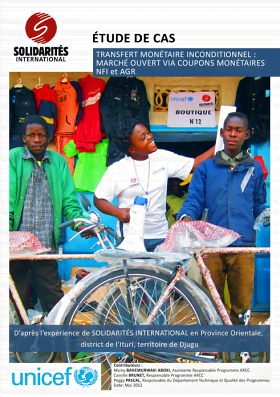
Transfert monétaire inconditionnel: marché ouvert via coupons monétaires
Rapport
Cette étude de cas, réalisée par Solidarités International, présente le projet ARCC (Alternative Responses for Communities in Crisis) ayant mis en oeuvre une distribution de jetons et coupons monétaires (vouchers) pouvant être utilisés dans un marché ouvert. Le projet visait à améliorer les...
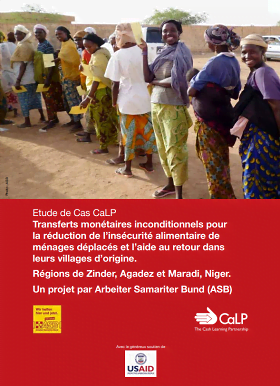
Transferts monétaires inconditionnels pour la réduction de l’insécurité alimentaire de ménages déplacés et l’aide au retour dans leurs villages d’origine
Rapport
En 2012, le Niger a été affecté par une crise alimentaire qui a entraîné des déplacements de populations. L’ONG ASB (Arbeiter Samariter Bund) est intervenue dans le domaine de la sécurité alimentaire pour palier au manque d’accès à la nourriture des déplacés et d’autres personnes...
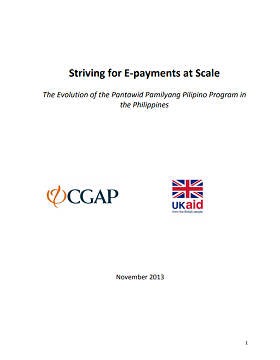
Striving for E-Payments at Scale in the Philippines
Report
As the Philippines experienced economic growth in the early 2000s, it still saw a rise in poverty. The Pantawid Pamilyang Pilipino Program (4Ps) is a conditional cash transfer program that aims to provide short-term poverty alleviation for poor households. The program emerged out of the country’s...

The Effect of Cash, Vouchers and Food Transfers on Intimate Partner Violence: Evidence from a randomized experiment in Northern Ecuador
Report
Despite the pervasive and far reaching consequences of intimate partner violence (IPV), there is little conclusive evidence on policy instruments to reduce or prevent violence. Using a randomized experiment in Northern Ecuador, this study provides evidence on whether cash, vouchers and food transfers...

Gatekeepers in Mogadishu: Research Consultancy
Report
Since 2011 the Somalia Cash Consortium has been implementing large-scale unconditional cash transfers (UCTs) under the Food Assistance to Vulnerable Households in South Central Somalia. Members of the Consortium have been confronted with the challenge of having to negotiate security and access to IDP...
